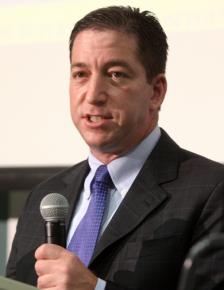Trying to intimidate a journalist
The British government used an anti-terrorism law in an attempt to intimidate journalist Glenn Greenwald--but Greenwald is vowing to fight back, reports .
SETTING A new low in the war on civil liberties, the British government detained Guardian columnist Glenn Greenwald's partner, David Miranda, for nine hours at London Heathrow Airport on August 18, using an anti-terrorism law to justify its actions.
Miranda, who had been a visiting documentary filmmaker in Berlin and was making a stopover at Heathrow on the way back to Rio de Janeiro, where he lives with Greenwald, was detained under a section of Britain's Terrorism Act 2000, which allows people to be detained at airports or border areas for questioning for up to nine hours before being either arrested or released.
Miranda was eventually let go, but not before officials seized his phone, laptop, camera, memory sticks, DVDs and other items. Lawyers for the Guardian who requested to meet with Miranda while he was being held were refused access. Brazilian officials, including the Brazilian ambassador in London, were also not allowed to speak to Miranda.
"They got me to tell them the passwords for my computer and mobile phone," Miranda told the Guardian. "They said I was obliged to answer all their questions and used the words 'prison' and station' all the time."

Miranda's detention, of course, has nothing to do with any suspected involvement in terrorism, but because of Greenwald's and filmmaker Laura Poitras' work in helping National Security Agency (NSA) leaker Edward Snowden publicize damning information about the vast scope of U.S. government surveillance against ordinary citizens.
Snowden has been charged with conveying classified information to an unauthorized party, disclosing communications intelligence information, and theft of government property for his role in releasing the information to the public. He remains in Russia, where he has been granted temporary asylum.
Miranda, who had met with Poitras in Berlin, said he was repeatedly questioned about the two journalists and their work. "They even asked me about the protests in Brazil, why people were unhappy and who I knew in the government," said Miranda.
"It is clear why those took me," said Miranda. "It's because I'm Glenn's partner. Because I went to Berlin. Because Laura lives there. So they think I have a big connection. But I don't have a role. I don't look at documents. I don't even know if it was documents that I was carrying. It could have been for the movie that Laura is working on."
THE BRITISH government is refusing to comment on why it detained Miranda. But as Greenwald pointed out, British government statistics regarding interrogations under Schedule 7 of the Terrorism Act show that fewer than three people in every 10,000 are examined as they pass through UK borders--and that only 0.06 percent of all people detained are kept for more than six hours. Given that, it's impossible to believe Miranda's detention was anything other than premeditated harassment on the part of the British government, possibly in conjunction with the Obama administration in the U.S., which has been the chief persecutor of Snowden and Greenwald.
The day after Miranda's detention, White House spokesman Josh Earnest told reporters that the U.S. officials had received advance notice from British authorities that Miranda would be detained--though Earnest claimed the action was not the result of a request from the U.S. "This was a decision that was made by the British government without the involvement and not at the request of the United States government," Earnest said. "It's as simple as that."
[T]hey obviously had zero suspicion that David was associated with a terrorist organization or involved in any terrorist plot. Instead, they spent their time interrogating him about the NSA reporting which Laura Poitras, the Guardian and I are doing, as well the content of the electronic products he was carrying. They completely abused their own terrorism law for reasons having nothing whatsoever to do with terrorism: a potent reminder of how often governments lie when they claim that they need powers to stop "the terrorists," and how dangerous it is to vest unchecked power with political officials in its name...
This is obviously a rather profound escalation of their attacks on the news-gathering process and journalism. It's bad enough to prosecute and imprison sources. It's worse still to imprison journalists who report the truth. But to start detaining the family members and loved ones of journalists is simply despotic. Even the Mafia had ethical rules against targeting the family members of people they felt threatened by. But the UK puppets and their owners in the U.S. national security state obviously are unconstrained by even those minimal scruples.
Greenwald has vowed that this attack on his family will not deter him from reporting on the crimes of the U.S. surveillance state--but will make him even more determined to expose the truth about government surveillance by the U.S. and the UK. As he told the Guardian: "The actions of the UK pose a serious threat to journalists everywhere. But the last thing it will do is intimidate or deter us in any way from doing our job as journalists. Quite the contrary: it will only embolden us more to continue to report aggressively."


